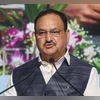Union Health Minister J P Nadda on Sunday said he would not allow any dilution in the standards of teaching and faculty at all the new AIIMS set up across the country as he vowed to protect the institute's brand.
Addressing the BJMFCON 2024, a forum of doctors from Bihar and Jharkhand practising in Delhi-NCR, Nadda said AIIMS-Delhi was set up in the '60s but it was only in the '80s that it became a brand name.
"It takes 10 to 20 years for any institution to grow and function in full swing. I will not allow the dilution of the standards of AIIMS and will protect its brand name," Nadda said, adding that no compromise will be made in the faculty recruitment.
The health minister also said that the groundbreaking ceremony for AIIMS-Darbhanga will be held soon, while the commissioning of AIIMS-Deoghar has been done and recruitment of staff is presently underway.
Stating that several policy interventions have been made to transform medical education in the past 10 years, Nadda said, "In the 2017 health policy, we tried to make it comprehensive and holistic. Earlier, the stress was on the curative aspect but now the focus is on preventive, promotive, curative palliative and rehabilitative aspects -- a holistic approach."
Underlining the government's efforts on preventive aspects of healthcare and early detection of diseases in the country, he said there are 1.73 lakh high-quality Ayushman Arogya Mandirs in India that go through a high-quality digital assessment.
Out of these, 10,716 Ayushman Arogya Mandirs have been set up in Bihar which have witnessed a footfall of 8.35 crore so far while there have been 4.36 crore screenings for non-communicable diseases (NCDs).
More From This Section
There are 3,825 similar facilities in Jharkhand witnessing a footfall of 2.33 crore and 2.12 crore NCD screenings.
The focus of these facilities is on early detection of NCDs.
Highlighting the strides made in mother and child health, Nadda said that "institutional deliveries increased from 78.9 per cent to 88.6 per cent in the first five years of Modi government".
Nadda also mentioned the implementation of the world's largest Covid-19 vaccination programme with more than 220 crore doses being administered in the country.
The health minister also commended the healthcare providers "for their relentless efforts to ensure the accessibility of healthcare services even in the remotest areas of the country" as he highlighted their efforts and service during the Covid-19 pandemic.
From 387 before 2014 to 766 now, an increase of 98 per cent in the number of medical colleges has been ensured under Prime Minister Narendra Modi's leadership, he said.
A total of 157 district hospitals have been converted into medical colleges of which eight are in Bihar, including at Purnia, Saran, Samastipur and Jhajharpur, Siwan, Buxar and Jamui, while five are in Jharkhand at Dumka, Hazaribagh, Palamu, Chaibasa, and Kodarma, Nadda said.
He also emphasised that "the Patna Medical College and Hospital (PMCH) is being redeveloped into Asia's second-largest hospital".
The number of MBBS (Bachelor of Medicine and Bachelor of Surgery) seats has gone up by 125 per cent, from 51,348 before 2014 to 1,15, 412 now, he said.
Pointing out that there has been an increase of 134 per cent in postgraduate (PG) seats from 31,185 before 2014 to 73,111 now, Nadda added that "under the Ayushman Bharat Pradhan Mantri Jan Arogya Yojana (PM-JAY), the world's largest health insurance scheme, treatment worth Rs 86,797 crore has been authorised so far".
As part of its commitment to senior citizens' healthcare, the government has extended the Ayushman Bharat PM-JAY to all those aged 70 and above, with healthcare benefits amounting to up to Rs 5 lakh, Nadda said.
The health minister also claimed that the Swachh Bharat Abhiyan helped reduce child mortality while the Ayushman Bharat health insurance scheme cut down the out-of-pocket expenditures of the people.
)